
Part 2 MARK STATMAN: MEXICO AND THE POETRY OF GRIEF AND CELEBRATION
Part 2 of my interview with Mark Statman looks closely at Mark’s Latin American poetic influences, his life in Mexico and ends with an extract
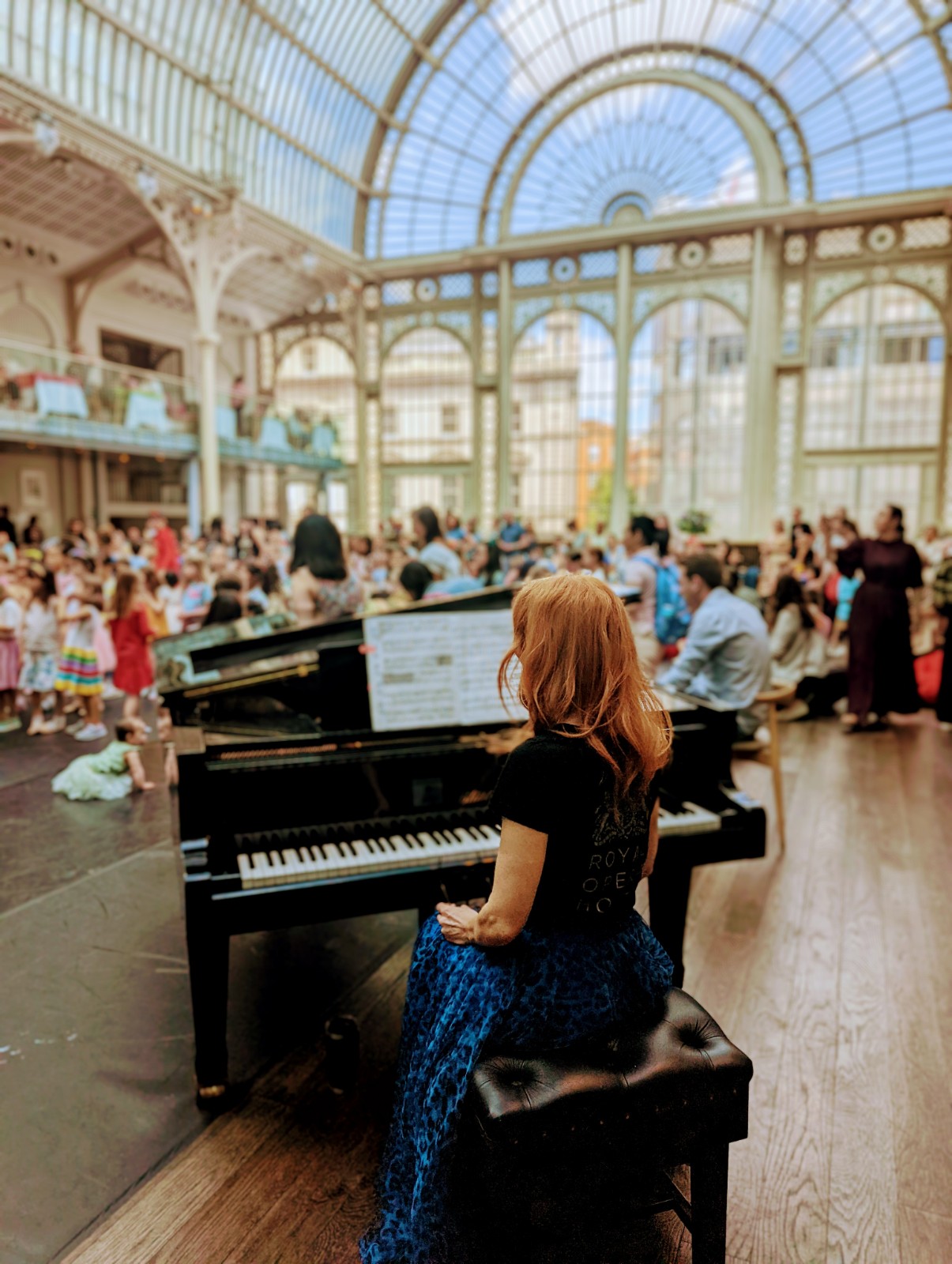
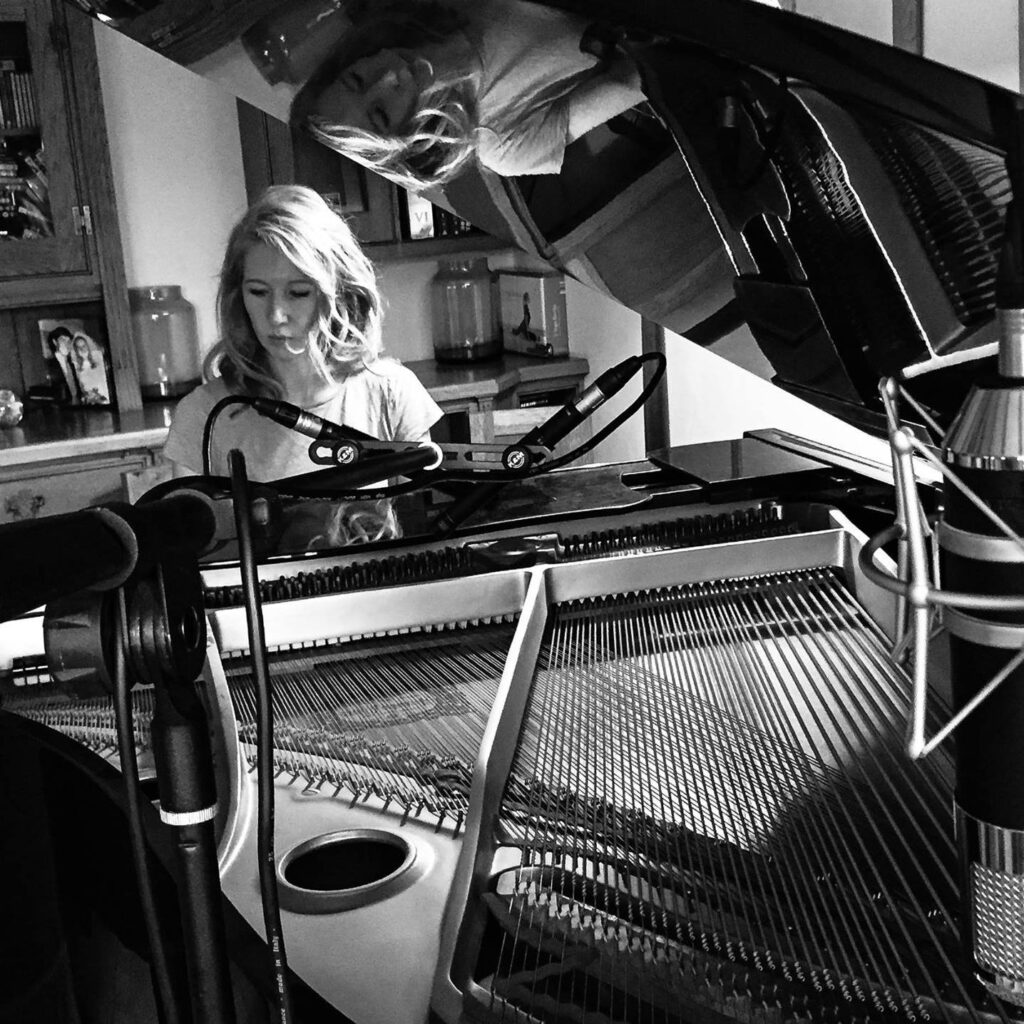
I interviewed Frances Yonge who creates live piano music for educational workshops at the Royal Opera House. As a skilled accompanist, Frances has free rein to interpret the great ballet scores in ways that work for the class. Frances is also a community musician working with several adult choirs and a songwriter who has recorded eight albums so far, with more to come. She was recently shortlisted for the Platinum Jubilee song competition.
Leslie: Tell us what you do with Chance to Dance and Ballet Dots. Can you give us some examples, please, of how you modify classical scores to help the class? What causes you to improvise during these sessions?
Frances: I have worked as a creative dance pianist for the Royal Opera House since 2011. My work has ranged from playing skipping music for large classes of children to accompanying a Ballet barre session at the Family Sundays. As a pianist in the education department, I have been lucky to learn the most popular themes from many ballets which I have weaved into exercises for workshops. Knowing the harmonic structure, melody and feel of themes means I can adapt them for the moment, often simplifying them for children.
An example of this was playing the ‘Storm’ section of Swan Lake for a Family Sunday which is extremely complex, fast and hard to count. Knowing the section has lots of diminished chords and is very chromatic was enough for me to create the correct feel for the workshop and make it clearer for counting. In these instances, I have half an eye on the music and half on the class, altering things as I go.
For ballet barre, the music is free with no score. The teacher marks out an exercise and in those moments I start composing in my head. A good teacher always inspires ideas and it is very much a collaboration. Once the exercise is set, I produce music with a clear introduction and suitable feel for the exercise, whether plies, tendus or port de bras. There is a huge trust triangle between teacher, pianist and dancers – my job is to maintain the flow. The communication between us all is non-verbal and I have to be able to read the room well and adapt quickly if necessary.
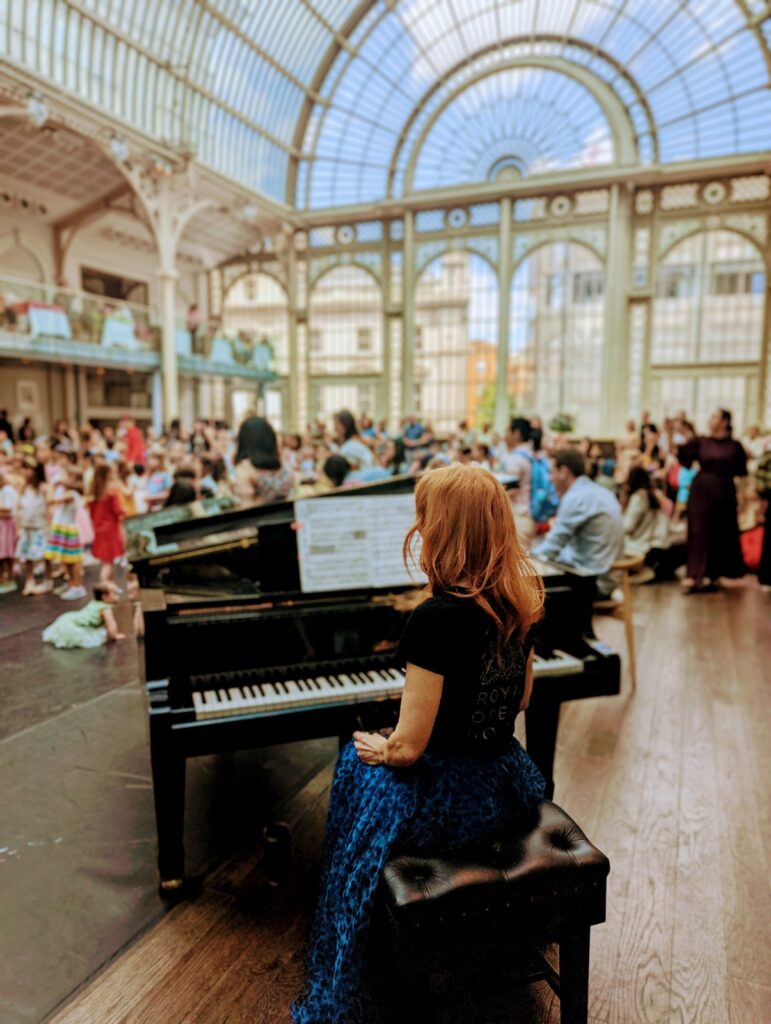
I love this work because I enjoy being in a supportive role and the performance is not about me. It is also a highly creative and intuitive process which makes me feel very alive! Invigorating, too, because whatever preparations I have made, I never know what music will emerge. The more I ‘let go’ and trust the creative process, the better the music is. Sometimes I’ll ask the teacher if anything particular is needed before a session and the answer is usually ‘do what you think’. It is lovely to have such trust placed in you and a real buzz to watch people dancing to your music.
Leslie: Can you describe what Liberty Choir do and your part in it, when connecting with people in prison, please.
Frances: My accompanying work with Liberty Choir will begin regularly in March, but I have visited several prisons already and undergone training. It is an awe-inspiring project which takes singing groups into prisons to help prisoners with rehabilitation, instil a sense of community, and develop their confidence.
I have learnt a lot already about how to talk to prisoners and finding common musical ground is a good way to connect. Also, to bring warmth and authenticity to sessions so participants remember humanity and kindness. There is even hugging! The people that attend are often near the end of their time in prison, so Liberty Choir provides a bridge to normality. People often go on to attend the regular choirs in London afterwards.
Leslie: What music do Compass Choir perform and why? How does that differ from (or resemble) Cranbrook Choral Society and The Wealden Consort repertoire?
Frances: Compass Choir was started after the local community was left reeling when a young man tragically took his own life. A local GP galvanised such interest in the choir that in the introductory week hundreds came to sing. The emphasis has always been on wellbeing and community, so the priority is keeping music simple and fun, sticking to three-part harmonies and at least two unison songs at each session. Singers at Cranbrook Choral Society and Wealden Consort tend to be music readers so the repertoire is more complex.
I enjoy the variety of repertoire from all the choirs I play for and learn so much from each one. From my vantage point at the piano, I love witnessing the process of a choir learning a song, especially when it is the first opportunity some people have ever had to make music. One of my life’s joys is to see people singing and it is an honour to serve the community in such a positive way. I was particularly moved to witness older people returning to choir after the lockdowns; many still worried about Covid, but prioritising singing!
Leslie: When you direct a musical theatre production, a school show or a choir in a care home how do you a) choose what to perform b) get the best out of your singers and musicians?
Frances: It amazes me that most people say they can’t sing when they can. A lack of confidence has often been instilled at an early age. A lady at a care home said to me that at school she had been given a gold star for not singing. What a terrible shame.
With this in mind, I have found that to lead sessions well one must exude confidence and enjoyment, and forget inhibition. This gives people permission to lose their inhibitions. It is so important to prepare well so you can communicate the music with integrity, and to focus completely on the love of the music. I often ask people to think about the meaning behind songs which opens up conversation and understanding.
I also try to convey that it’s ok to make mistakes. All musicians know it’s how you learn but many are terrified of getting things wrong. I have had people ask me for singing lessons to check ‘if they are singing right’. They normally are but just need to relax.
Leslie: You have “an ability to both learn music quickly and to improvise.” Where did this come from? Can you tell the story of your musical upbringing and how that has developed in later life?
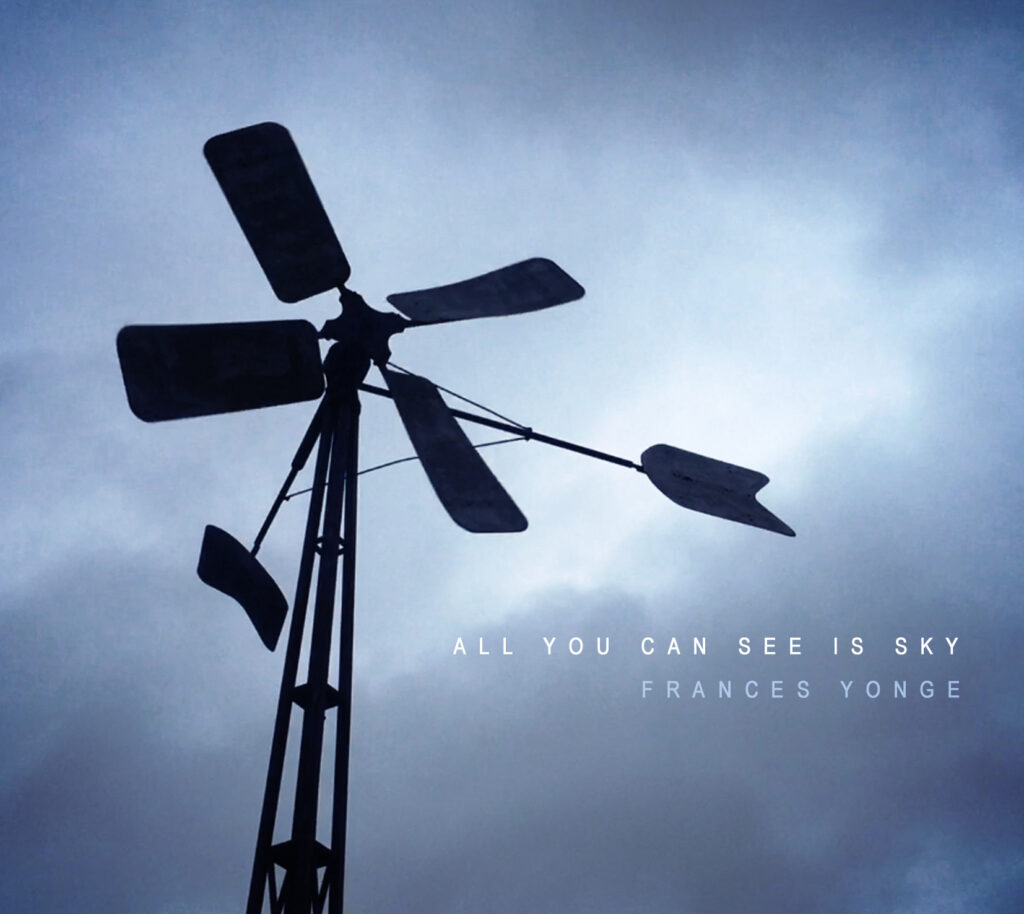
Frances: My creativity was sparked at a young age because I had hands-off parents who allowed me time and space for imagining. I started piano lessons at 9 and reading music came naturally. I was lucky to have a piano teacher who was a composer herself (Debbi Parks, who also taught me how to improvise for ballet). Piano lessons mostly consisted of me playing my latest composition rather than focusing on technique! Even now, I am torn between improving my piano technique and creating music, but seem to find a happy balance most of the time. I always feel challenged by my accompanying work and have to learn vast quantities of music weekly.
It was playing for ballet that really developed my improvising skills, being in the deep end and having to keep the class going! Also working from some very tricky scores developed my technique. Song-writing, however, has been a constant and will always be my first and best method of musical communication. A companion for life.
At 47, I feel I have so much more to learn and am constantly trying to improve. Improvising is so different to playing from a score and it’s vital to keep both parts of your brain awake.
Leslie: Can you describe the thinking behind your latest albums? What parts of the story of your life have gone into your albums (and what parts have you missed out)?
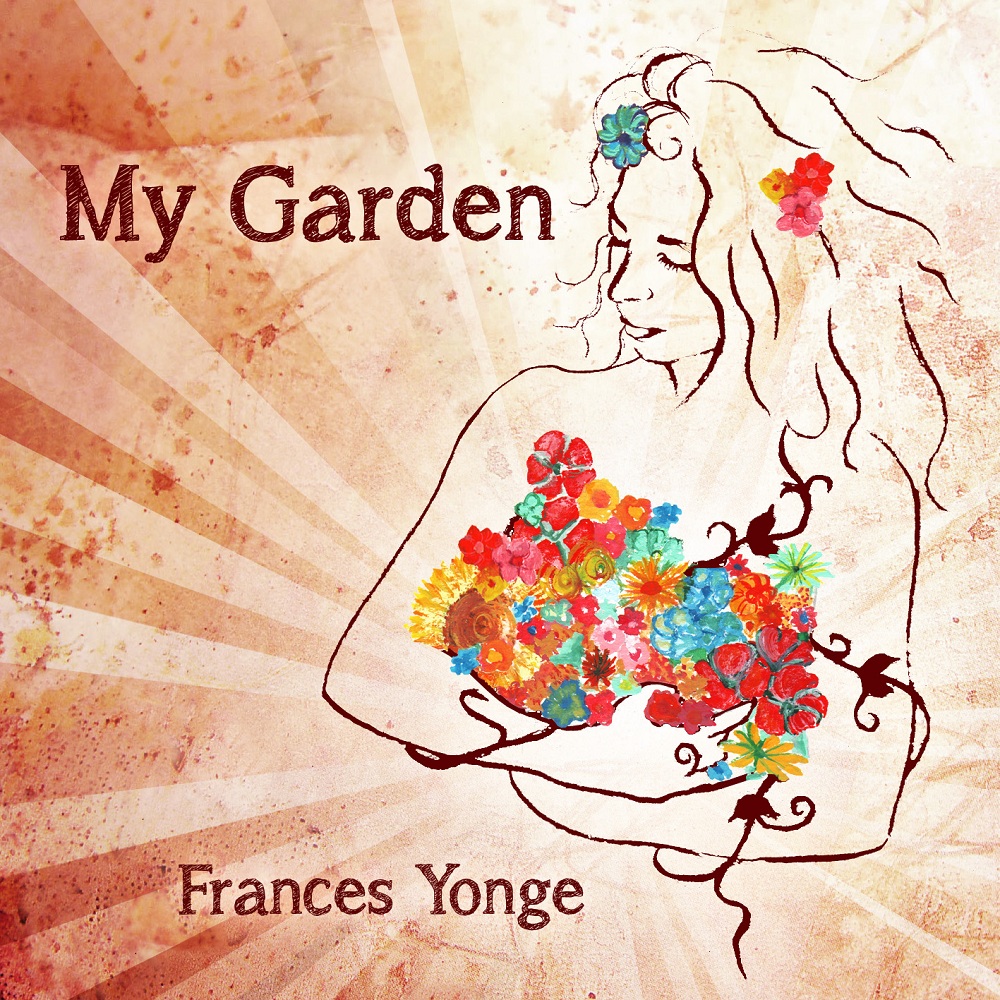
Frances: The songs on my albums are basically anything that has inspired or moved me. This ranges from ‘Muted World’, a song about snorkelling in the Red Sea, to ‘My Garden’, a devotional song to my children, and ‘All you can see is sky’, a song about escapism. The music is hard to describe and someone once said ‘it is in a genre of its own’.
Often, it is just a fleeting vision that gives birth to a song. I find the creative life I have tapped into makes me notice little, unusual things. Writing songs is a way of making sense of life’s complexities and has given me purpose and meaning. It’s a mystical process which I can’t explain. Suffice to say my life would be much less satisfying without it.
Most big experiences in my life have been recorded as songs but there are indeed parts that are still untold. This might be because an experience is too raw or to protect loved ones. Whilst I love to be authentic, it feels ok not to tell all….
Next week I interviewed Dr Josephine Balmer, acclaimed translator of Sappho, Catullus, Ovid and historian-poet whose investigative work looks deep into hidden aspects of classical culture.
ABOUT LESLIE TATE’S BOOKS:

Part 2 of my interview with Mark Statman looks closely at Mark’s Latin American poetic influences, his life in Mexico and ends with an extract

I interviewed international poet and translator Mark Statman about Volverse/Volver, his 14th published collection. Mark, who has won national arts awards, is Emeritus Professor of Literary

I interviewed Lisa Dart, finalist in the Grolier, Aesthetica and Troubadour Poetry Prizes and author of The Linguistics of Light (poems, Salt, 2008), Fathom (prose

I interviewed writer Julia Lee Barclay-Morton about her experience of autism. Julia began as an experimental dramatist in New York, moving to the UK to

I interviewed Gillean McDougall from Glasgow, who edited the collaborative projects Honest Error (on Charles Rennie Mackintosh and his wife Margaret Macdonald) and Writing the
| Cookie | Duration | Description |
|---|---|---|
| cookielawinfo-checkbox-analytics | 11 months | This cookie is set by GDPR Cookie Consent plugin. The cookie is used to store the user consent for the cookies in the category "Analytics". |
| cookielawinfo-checkbox-functional | 11 months | The cookie is set by GDPR cookie consent to record the user consent for the cookies in the category "Functional". |
| cookielawinfo-checkbox-necessary | 11 months | This cookie is set by GDPR Cookie Consent plugin. The cookies is used to store the user consent for the cookies in the category "Necessary". |
| cookielawinfo-checkbox-others | 11 months | This cookie is set by GDPR Cookie Consent plugin. The cookie is used to store the user consent for the cookies in the category "Other. |
| cookielawinfo-checkbox-performance | 11 months | This cookie is set by GDPR Cookie Consent plugin. The cookie is used to store the user consent for the cookies in the category "Performance". |
| viewed_cookie_policy | 11 months | The cookie is set by the GDPR Cookie Consent plugin and is used to store whether or not user has consented to the use of cookies. It does not store any personal data. |